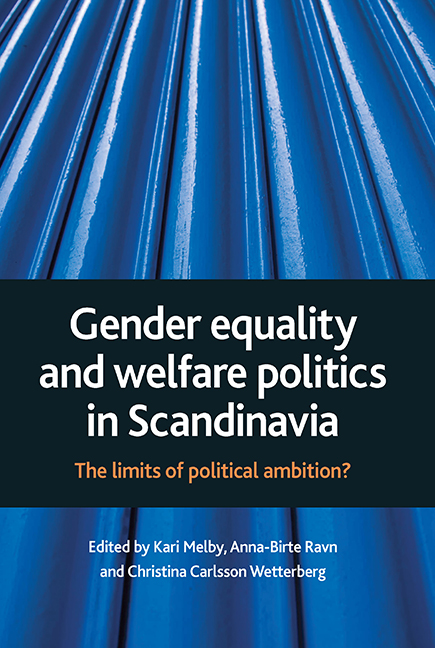Book contents
- Frontmatter
- Contents
- List of tables
- Preface
- Notes on contributors
- A Nordic model of gender equality? Introduction
- Part One Meanings of gender equality in Scandinavian welfare policy
- Part Two Current challenges: competing discourses on gender equality
- Postscript Gender, citizenship and social justice in the Nordic welfare states: a view from the outside
- Postscript Future research on gender equality in the Scandinavian countries
- Appendix Tables 1-10
- Index
eleven - A Scandinavian feminist public sphere: discourses on feminism and gender equality
Published online by Cambridge University Press: 21 January 2022
- Frontmatter
- Contents
- List of tables
- Preface
- Notes on contributors
- A Nordic model of gender equality? Introduction
- Part One Meanings of gender equality in Scandinavian welfare policy
- Part Two Current challenges: competing discourses on gender equality
- Postscript Gender, citizenship and social justice in the Nordic welfare states: a view from the outside
- Postscript Future research on gender equality in the Scandinavian countries
- Appendix Tables 1-10
- Index
Summary
Introduction
A common thread in this volume is the recurring challenge to and questioning of the official Scandinavian gender-equality discourses, as expressed at state level. Other threads I discuss in this chapter are a generational perspective between two generations of feminists and whether feminism has maintained some type of ‘intergenerational currency’ (Budgeon, 2001).
One such challenge is a debate initiated in the late 1990s by young, predominantly white middle-class feminists who are, generally speaking, the ‘daughters’ of the feminists in the women's movement of the 1970s across the three countries. The ‘daughters’ have been brought up and socialised to believe that the Scandinavian welfare states have, to a large extent, realised an ideal of gender equality. However, the debate, which consists of personal narratives of everyday experiences, is inconsistent with the official state optimism and the ideals of their upbringing. These women have academic degrees, a media profile and more cultural and social capital than any generation of Scandinavian women before them (Nielsen, 2002). Paradoxically, they still identify aspects of gender (in)equality in their everyday life.
The phenomenon studied in this chapter was termed ‘the new feminist debate’, the term describing a specific Scandinavian media debate. Voices questioned the welfare states in relation to gender equality by examining types of discrimination and inequality. At the same time, these voices echoed a wish for agency and empowerment – that is ‘the ability to act with others to do together what one could not have done alone’ (Ferguson, 1987).
From an international perspective, the Scandinavian countries are often considered a type of gender-equal ‘utopia’ (Karvonen and Selle, 1995; Fiig, 2008). However, the new feminist debate, far from contributing to a ‘discourse of utopia’, challenged it by highlighting various examples of inequality.
The purpose of this chapter is to analyse the new feminist debate. I draw on the part of the debate published in Danish, enriched with materials from the debate in Norway and Sweden. The chapter works as a reservoir of insights into Scandinavian discourses on feminism and gender equality. Two questions are addressed. First, what kind of feminist discourses become visible when the debate is observed from within a perspective of a public sphere? Second, in what ways does the debate challenge the Scandinavian state discourses on gender equality?
- Type
- Chapter
- Information
- Gender Equality and Welfare Politics in ScandinaviaThe Limits of Political Ambition?, pp. 199 - 214Publisher: Bristol University PressPrint publication year: 2008



